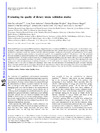Please use this identifier to cite or link to this item:
https://accedacris.ulpgc.es/jspui/handle/10553/44744
| Title: | Evaluating the quality of dietary intake validation studies | Authors: | Serra-Majem, Lluis Frost Andersen, Lene Henríque-Sánchez, Patricia Doreste-Alonso, Jorge Sánchez-Villegas, Almudena Ortiz-Andrelluchi, Adriana Negri, Eva La Vecchia, Carlo |
UNESCO Clasification: | 32 Ciencias médicas 3206 Ciencias de la nutrición |
Keywords: | Validation Studies Nutrient Intake Quality Score |
Issue Date: | 2009 | Journal: | British Journal of Nutrition | Abstract: | Within the EURopean micronutrient RECommendations Aligned Network of Excellence (EURRECA), a scoring system was developed to assess the quality of dietary intake validation studies. The scoring system included three steps. The first step was to give each study a quality score, which included five components: sample size, statistics used, data collection procedure, consideration of seasonality and supplement use. Scores ranged from 0 to 7, and validation studies classified as very good ( > or = 5), good (5-3.5), acceptable/reasonable (3.5-2.5) and poor ( < 2.5). The second and third steps included an adjustment/weighting of the correlation coefficient according to the quality score and moreover a rating of the adjusted/weighted correlation. The scoring system was tested in 124 validation studies that included at least one vitamin. Only 5.6 % of the 124 studies were judged to be of very good quality according to the quality score, 41.9 % of good quality and 16.9 % had a poor rating. When adjusting for the study quality scores, crude and adjusted mean correlations of vitamins A, C, D and E intakes were similar, but the percentage of correlation values classified as poor or very good was higher after adjustment. These results show the importance of considering the quality of studies validating dietary assessment methods and the correlations obtained for the micronutrient of interest when interpreting effects observed in epidemiological studies using dietary assessment methods. Without a doubt, this subject constitutes a key topic for research in nutritional epidemiology. | URI: | https://accedacris.ulpgc.es/handle/10553/44744 | ISSN: | 0007-1145 | DOI: | 10.1017/S0007114509993114 | Source: | British Journal of Nutrition [ISSN 0007-1145], v. 102 (sup. 1), p. S3-S9, (Diciembre 2009) |
| Appears in Collections: | Artículos |
SCOPUSTM
Citations
114
checked on Jun 8, 2025
WEB OF SCIENCETM
Citations
124
checked on Feb 1, 2026
Page view(s)
247
checked on Jan 15, 2026
Download(s)
185
checked on Jan 15, 2026
Google ScholarTM
Check
Altmetric
Share
Export metadata
Items in accedaCRIS are protected by copyright, with all rights reserved, unless otherwise indicated.
